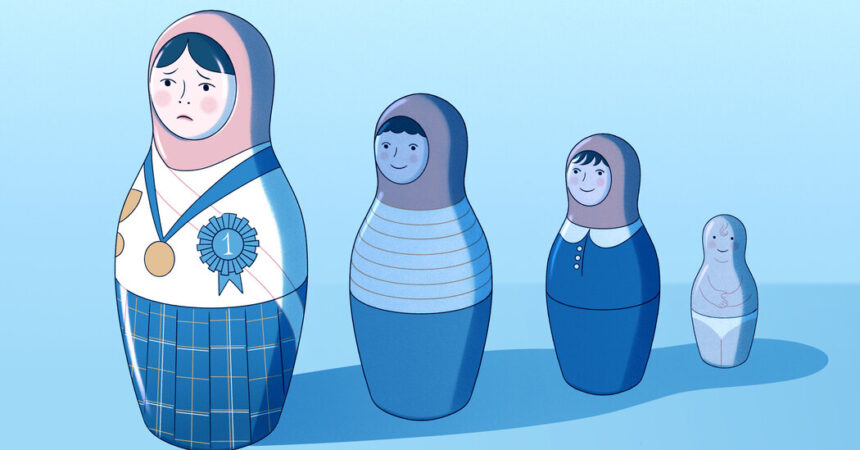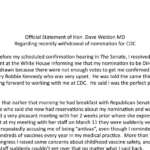In a TikTok video that has been watched greater than 6 million occasions, Kati Morton, a licensed marriage and household therapist in Santa Monica, Calif., lists indicators that she says might be indicative of “eldest daughter syndrome.”
Amongst them: an intense feeling of familial accountability, people-pleasing tendencies and resentment towards your siblings and oldsters.
On X, a viral submit asks: “are u completely satisfied or are u the oldest sibling and in addition a lady”?
Firstborn daughters are having a second within the highlight, a minimum of on-line, with memes and assume items providing a way of gratification to accountable, put-upon massive sisters in every single place. However even psychological well being professionals like Ms. Morton — herself the youngest in her household — warning in opposition to placing an excessive amount of inventory within the psychology of sibling delivery order, and the concept it shapes persona or long run outcomes.
“Individuals will say, ‘It means every part!’ Different individuals will say, ‘There’s no proof,’” she mentioned, noting that eldest daughter syndrome (which isn’t an precise psychological well being prognosis) might have as a lot to do with gender norms because it does with delivery order. “All people’s searching for to grasp themselves, and to really feel understood. And that is simply one other web page in that ebook.”
What the analysis says about delivery order
The stereotypes are acquainted to many people: Firstborn youngsters are dependable and high-achieving; center youngsters are sociable and rebellious (and ignored); and youngest youngsters are charming and manipulative.
Research have certainly discovered ties between an individual’s function within the household lineup and numerous outcomes, together with instructional attainment and I.Q. (although these scores will not be essentially dependable measures of intelligence), monetary threat tolerance and even participation in harmful sports activities. However many research have centered on a single time limit, cautioned Rodica Damian, a social-personality psychologist on the College of Houston. Meaning older siblings might have appeared extra accountable or much more clever just because they have been extra mature than their siblings, she mentioned, including that the pattern sizes in most delivery order research have additionally been comparatively small.
In bigger analyses, the hyperlink between delivery order and persona traits seems a lot weaker. A 2015 examine greater than 20,000 individuals in Germany, the UK and the USA discovered no hyperlink between delivery order and persona traits — although the researchers did discover proof that older youngsters have a slight benefit in I.Q. (So, eldest daughters, take your bragging rights the place you will get them.)
Dr. Damian labored on a unique large-scale examine, additionally revealed in 2015, that included greater than 370,000 excessive schoolers in the USA. It discovered slight variations in persona and intelligence, however the variations have been so small, she mentioned, that they have been primarily meaningless. Dr. Damian did permit that cultural practices akin to property or enterprise inheritance (which can go to the primary born) would possibly have an effect on how delivery order influences household dynamics and sibling roles.
Nonetheless, there is no such thing as a convincing some siblings who insist their delivery order has predestined their function within the household.
After her examine revealed, Dr. Damian appeared on a call-in radio present. The traces flooded with listeners who have been delighted to inform her how skewed her findings have been.
“Someone would say: ‘You’re flawed! I’m a firstborn and I’m extra conscientious than my siblings!’ After which another person would name in and say, ‘You’re flawed, I’m a later-born and I’m extra conscientious than my siblings!” she mentioned.
What private expertise says
Sara Stanizai, a licensed marriage and household therapist in Lengthy Seashore, Calif., runs a digital group with weekly meet-ups, the place contributors replicate on how they imagine their delivery order has affected them and the way it could also be persevering with to form their romantic lives, friendships and careers.
This system was impressed by Ms. Stanizai’s expertise as an eldest daughter in an Afghan-American household, the place she felt “parentified” and “overly accountable” for her siblings — partially as a result of she was older, and partially as a result of she was a lady.
Whereas Ms. Stanizai acknowledged that the analysis round delivery order is combined, she finds it helpful for a lot of of her shoppers to replicate on their delivery order and the way they imagine it formed their household life — notably in the event that they felt hemmed in or saddled by sure expectations.
Her remedy teams spend time reflecting on questions like: How does my household see me? How do I see myself? Can we discuss any discrepancies in our viewpoints, and the way they form household dynamics? As an example, an older sibling would possibly level out that she or he is commonly the one to plan household holidays. A youthful sibling would possibly level out that she or he usually feels pressured into going together with no matter the remainder of the group needs.
Whether or not or not there may be proof that delivery order determines persona traits is sort of irrelevant, specialists acknowledged.
“I feel persons are simply searching for which means and self-understanding,” Ms. Stanizai mentioned. “Horoscopes, delivery order, attachment types” are only a few examples, she mentioned. “Individuals are simply searching for a set of code phrases and methods of describing their experiences.”








